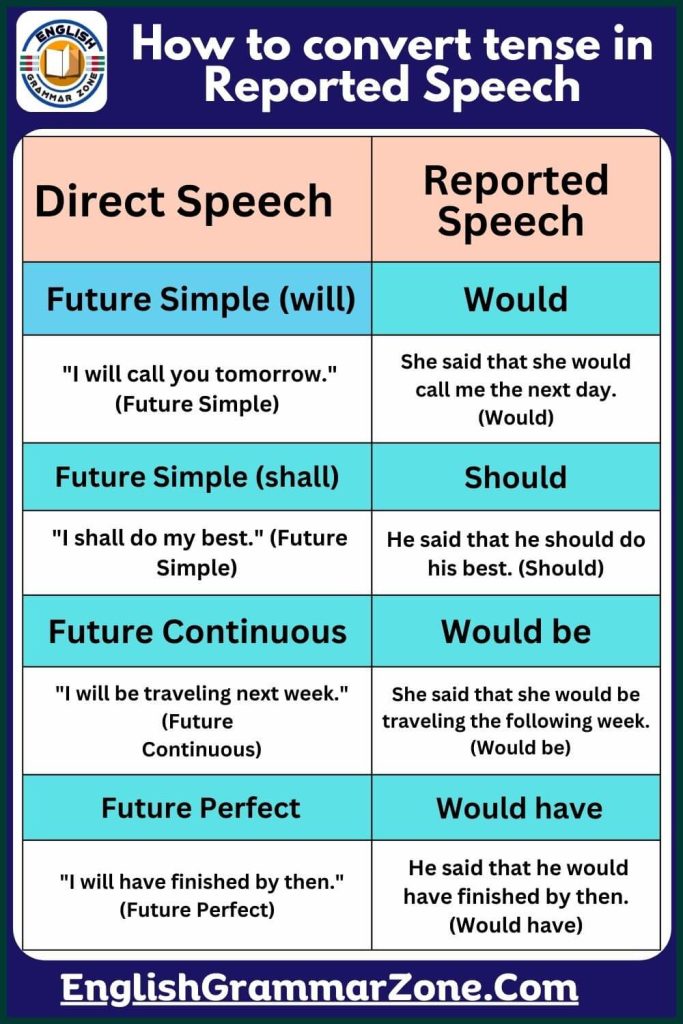Convert Tense from Direct to Indirect Speech with ease using this guide! Learn the simple rules and techniques to transform spoken or quoted statements into indirect speech accurately.

Convert Tense from Direct to Indirect Speech
Changing tense rules:
- Present Simple changes to Past Simple.
- Present Continuous changes to Past Continuous.
- Present Perfect changes to Past Perfect.
- Present Perfect Continuous changes to Past Perfect Continuous.
- Past Simple changes to Past Perfect.
- Past Continuous changes to Past Perfect Continuous.
- Past Perfect remains Past Perfect.
- Past Perfect Continuous remains Past Perfect Continuous.
- Future Simple (will) changes to Would.
- Future Simple (shall) changes to Should.
- Future Continuous changes to Would be.
- Future Perfect changes to Would have.
- Future Perfect Continuous changes to Would have been.
Changing tense rules:
- Direct Speech: “I am going to the store,” she said. Indirect Speech: She said that she was going to the store.
- Direct Speech: “I will call you tomorrow,” John promised. Indirect Speech: John promised that he would call me the next day.
- Direct Speech: “I have completed the project,” he mentioned. Indirect Speech: He mentioned that he had completed the project.
- Direct Speech: “We are going to the beach,” they said. Indirect Speech: They said that they were going to the beach.
- Direct Speech: “She is studying for her exams,” he said. Indirect Speech: He said that she was studying for her exams.
- Direct Speech: “I ate lunch at noon,” she said. Indirect Speech: She said that she had eaten lunch at noon.
- Direct Speech: “I am watching TV,” he said. Indirect Speech: He said that he was watching TV.
- Direct Speech: “They were playing soccer,” she mentioned. Indirect Speech: She mentioned that they had been playing soccer.
- Direct Speech: “I will help you with that,” she assured. Indirect Speech: She assured that she would help me with that.
- Direct Speech: “I had just finished work,” he said. Indirect Speech: He said that he had just finished work.
- Direct Speech: “I am going to start a new job,” she announced. Indirect Speech: She announced that she was going to start a new job.
- Direct Speech: “We saw a movie last night,” they said. Indirect Speech: They said that they had seen a movie the night before.
- Direct Speech: “I can’t find my keys,” he said. Indirect Speech: He said that he couldn’t find his keys.
- Direct Speech: “She will arrive soon,” he said. Indirect Speech: He said that she would arrive soon.
- Direct Speech: “I am making dinner,” she said. Indirect Speech: She said that she was making dinner.
- Direct Speech: “They have visited Paris,” she said. Indirect Speech: She said that they had visited Paris.
- Direct Speech: “I will be there by 5 PM,” he said. Indirect Speech: He said that he would be there by 5 PM.
Frequently Asked Questions:
1. What is Direct Speech and Indirect Speech?
Direct speech is when we quote someone’s exact words. For example:
- John said, “I am going to the market.”
Indirect speech, on the other hand, paraphrases what was said. The exact words are not quoted but instead conveyed in a report. For example:
- John said that he was going to the market.
In indirect speech, the pronouns and verb tenses often change to fit the new structure of the sentence.
2. Why Do We Need to Convert Tenses from Direct to Indirect Speech?
Converting tenses from direct to indirect speech is important because it helps maintain the accuracy of what someone is saying without repeating their exact words. This is commonly used in writing, especially in stories, reports, and even news articles. It allows us to summarize and convey the message efficiently, making it easier for the reader or listener to understand.
3. How Do I Convert Present Tense from Direct to Indirect Speech?
When converting present tense from direct to indirect speech, the tense usually changes to the past. For example:
- Direct speech: She says, “I am reading a book.”
- Indirect speech: She said that she was reading a book.
Notice that the present continuous tense “am reading” becomes “was reading” in indirect speech.
4. How Do I Convert Past Tense from Direct to Indirect Speech?
When the direct speech is in the past tense, we often shift it to a past perfect tense in indirect speech. For instance:
- Direct speech: He said, “I went to the park yesterday.”
- Indirect speech: He said that he had gone to the park the day before.
This helps to maintain the temporal relationship between the actions in the sentence.
5. What Happens to Future Tense When Converting from Direct to Indirect Speech?
Future tenses usually shift to the conditional tense in indirect speech. For example:
- Direct speech: She will say, “I will attend the party tomorrow.”
- Indirect speech: She said that she would attend the party the next day.
This change reflects that the event is still in the future but is being reported indirectly.
6. Do the Pronouns Change When Converting Tenses?
Yes, pronouns in direct speech often change when converting to indirect speech. For example, the pronoun “I” might change to “he” or “she,” depending on the subject of the sentence.
- Direct speech: I said, “I am going home.”
- Indirect speech: He said that he was going home.